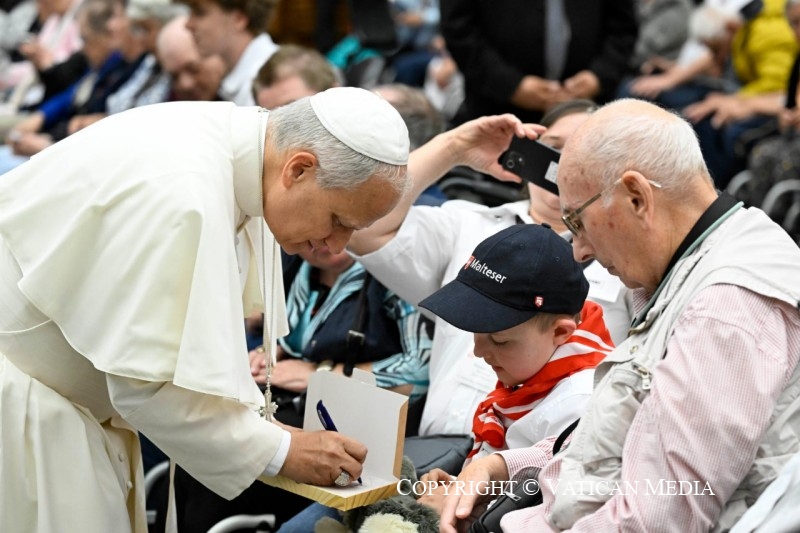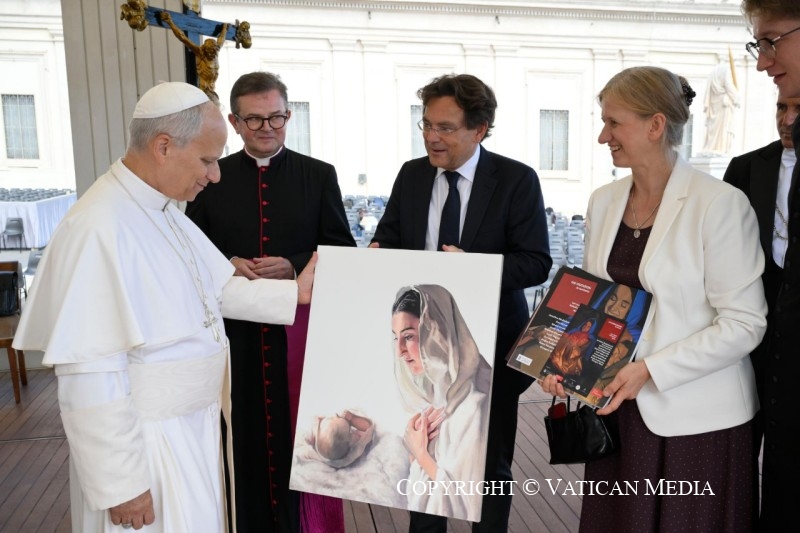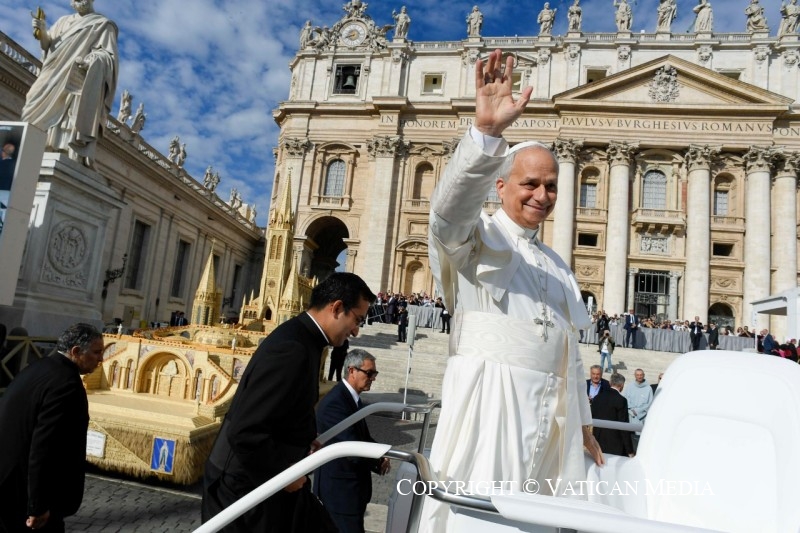Cycle of Catechesis – Jubilee 2025. Jesus Christ our Hope. III. The Passover of Jesus. 9. The Resurrection. “Peace be with you!” (Jn 20:21)
Dear brothers and sisters, good morning!
The centre of our faith and the heart of our hope are firmly rooted in the resurrection of Christ. When we read the Gospels carefully, we realize that this mystery is surprising not only because a man – the Son of God – rose from the dead, but also because of the way he decided to do so. Indeed, Jesus’ resurrection is not a bombastic triumph, nor is it revenge or retaliation against his enemies. It is a wonderful testimony to how love is capable of rising again after a great defeat in order to continue its unstoppable journey.

When we get up again after a trauma caused by others, often the first reaction is anger, the desire to make someone pay for what we have suffered. The Risen One does not react in this way. When he emerges from the underworld of death, Jesus does not take revenge. He does not return with gestures of power, but rather with meekness he manifests the joy of a love greater than any wound and stronger than any betrayal.
The Risen One does not feel any need to reiterate or affirm his own superiority. He appears to his friends – the disciples – and he does so with extreme discretion, without forcing the pace of their capacity for acceptance. His only desire is to return to communion with them, helping them to overcome the sense of guilt. We see this very well in the Upper Room, where the Lord appears to his friends who are enclosed in fear. It is a moment that expresses extraordinary power: Jesus, after descending into the abysses of death to liberate those who were imprisoned there, enters the closed room of those who are paralyzed by fear, bringing them a gift that no-one would have dared to hope for: peace.
His greeting is simple, almost ordinary: “Peace be with you!” (Jn 20:19). But it is accompanied by a gesture so beautiful that it is almost disconcerting: Jesus shows the disciples his hands and his side, with the marks of the passion. Why show his wounds to those who, in those dramatic hours, had denied and abandoned him? Why not hide those signs of pain and avoid reopening the wound of shame?

Yet, the Gospel says that, seeing the Lord, the disciples rejoiced (cf. Jn 20:20). The reason is profound: Jesus is now fully reconciled with everything he has suffered. There is not a shadow of resentment. The wounds serve not to reproach, but to confirm a love stronger than any infidelity. They are the proof that, even in the moment of our failure, God did not retreat. He did not give up on us.
In this way, the Lord shows himself to be naked and defenceless. He does not demand, he does not hold us to ransom. His is a love that does not humiliate; it is the peace of one who has suffered for love and can now finally affirm that it was worthwhile.
Instead, we often mask our wounds out of pride, or for fear of appearing weak. We say, “it doesn’t matter”, “it is all in the past”, but we are not truly at peace with the betrayals that have wounded us. At times we prefer to hide our effort to forgive so as not to appear vulnerable and to risk suffering again. Jesus does not. He offers his wounds as a guarantee of forgiveness. And he shows that the Resurrection is not the erasure of the past, but its transfiguration into a hope of mercy.

Then, the Lord repeats: “Peace be with you!”. And he adds, “As the Father has sent me, even so I send you” (v. 21). With these words, he entrusts the apostles with a task that is not so much a power as a responsibility: to be instruments of reconciliation in the world. As if he said: “Who will be able to proclaim the merciful face of the Father, if not you, who have experienced failure and forgiveness?”.
Jesus breathes on them and gives them the Holy Spirit (v. 22). It is the same Spirit who sustained him in obedience to the Father and in love even to the cross. From that moment, the apostles will no longer be able to remain silent about what they have seen and heard: that God forgives, lifts up, and restores trust.

This is the heart of the mission of the Church: not to administer power over others, but to communicate the joy of those who are loved precisely when they did not deserve it. It is the strength that gave rise to the Christian communities and made them grow: men and women who discovered the beauty of returning to life to be able to give it to others.
Dear brothers and sisters, we too are sent. The Lord shows us his wounds and says: Peace be with you. Do not be afraid to show your wounds healed by mercy. Do not be afraid to draw close to those who are trapped in fear or guilt. May the breath of the Spirit make us, too, witnesses of this peace and this love that is stronger than any defeat.
Source: vatican.va





